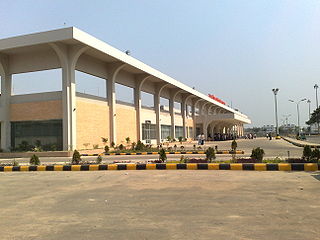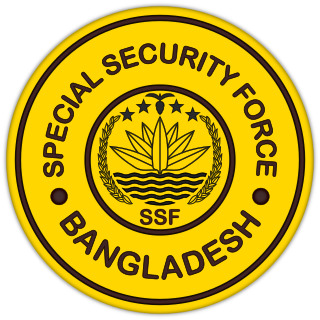 | |
| Headquarters | Dhaka, Bangladesh |
|---|---|
Region served | Bangladesh |
Official language | Bengali |
| Website | www |
NGO Affairs Bureau [1] is a government bureau in Bangladesh that regulates Non-governmental agencies.
 | |
| Headquarters | Dhaka, Bangladesh |
|---|---|
Region served | Bangladesh |
Official language | Bengali |
| Website | www |
NGO Affairs Bureau [1] is a government bureau in Bangladesh that regulates Non-governmental agencies.
NGO Affairs Bureau was founded in 1990. [2] All NGOs that receive fund from outside Bangladesh are required by law to register with the bureau which falls under the Chief Advisor's office. [3] Mohammad Asadul Islam is the present director general of the bureau. [4] There are 2,498 NGOs registered with the bureau of which 240 are foreign and the rest are domestic. [5]

Bangladesh, officially the People's Republic of Bangladesh, is a country in South Asia. It is the eighth-most populous country in the world and among the most densely populated with a population exceeding 170 million within an area of 148,460 square kilometres (57,320 sq mi). Bangladesh shares land borders with India to the north, west, and east, and Myanmar to the southeast. To the south, it has a coastline along the Bay of Bengal. To the north, it is separated from Bhutan and Nepal by the Siliguri Corridor, and from China by the mountainous Indian state of Sikkim. Dhaka, the capital and largest city, is the nation's political, financial, and cultural centre. Chittagong is the second-largest city and the busiest port of the country. The official language is Bengali. Islam is the official and largest religion and Bengali Muslims form the largest ethnoreligious group in the country.

The economy of Bangladesh is a major developing mixed economy. As the second-largest economy in South Asia, Bangladesh's economy is the 35th largest in the world in nominal terms, and 25th largest by purchasing power parity. Bangladesh is seen by various financial institutions as one of the Next Eleven. It has been transitioning from being a frontier market into an emerging market. Bangladesh is a member of the South Asian Free Trade Area and the World Trade Organization. In fiscal year 2021–2022, Bangladesh registered a GDP growth rate of 7.2% after the global pandemic. Bangladesh is one of the fastest growing economies in the world.

The foreign relations of Bangladesh are Bangladesh's relationships with foreign countries. The Government of Bangladesh's policies pursue a moderate foreign policy that heavily relies on multilateral diplomacy, especially at the United Nations (UN) and the World Trade Organization (WTO). Since its independence in 1971, Bangladesh has stressed its principle of "Friendship towards all, malice towards none" in dictating its diplomacy. As a member of the Non-Aligned Movement, Bangladesh has tended to not take sides with major powers. Since the end of the Cold War, Bangladesh has pursued better relations with its neighbours and other nearby states.

BRAC is an international development organisation based in Bangladesh. In order to receive foreign donations, BRAC was subsequently registered under the NGO Affairs Bureau of the Government of Bangladesh. BRAC is the largest non-governmental development Organisation in the world, in terms of the number of employees as of September 2016. Established by Sir Fazle Hasan Abed in 1972 after the independence of Bangladesh, BRAC is present in all 64 districts of Bangladesh as well as 16 other countries in Asia, Africa, and the Americas.

Education in Bangladesh is administered by the country's Ministry of Education. The Ministry of Primary and Mass Education implements policies for primary education and state-funded schools at a local level. Education in Bangladesh is compulsory for all citizens until the end of grade eight. Primary and secondary education is funded by the state and free of charge in public schools.

The Directorate General of Forces Intelligence, commonly known by its acronym DGFI, is the defense intelligence agency of the Bangladesh Armed Forces, tasked with collection, collation and evaluation of strategic and topographic information, primarily through human intelligence (HUMINT). As one of the principal members of the Bangladesh intelligence community, the DGFI reports to the Director-General under the executive authority of the head of government, the Prime Minister, and is primarily focused on providing intelligence for the Prime Minister, the Cabinet of Bangladesh, and the Armed Forces of Bangladesh.

The bilateral relations between the neighboring People's Republic of Bangladesh and the Republic of India, formally began in 1971 with India's recognition of an independent Bangladesh following India's military intervention helping Bangladesh secure independence following the Bangladesh Liberation War.

Osmani International Airport in Sylhet, is the third largest airport in Bangladesh after Dhaka and Chittagong. The airport is operated by the Civil Aviation Authority and is served by Biman Bangladesh Airlines, the national airline, which at one point earned most of its revenue from this airport. Private airlines Novoair and US-Bangla Airlines operate domestic flights to Dhaka.

The Special Security Force is a Bangladeshi law enforcement agency that provides protection to the President, Prime Minister and the Chief Adviser as well as any person designated as a VVIP as per state protocol, including visiting foreign dignitaries.

The Asiatic Society of Bangladesh is a non political and non profit research organisation registered under both Society Act of 1864 and NGO Affairs Bureau, Government of Bangladesh. The Asiatic Society of Bangladesh was established as the Asiatic Society of East Pakistan in Dhaka in 1952 by a number of Muslim leaders, and renamed in 1972. Ahmed Hasan Dani, a noted Muslim historian and archaeologist of Pakistan played an important role in founding this society. He was assisted by Muhammad Shahidullah, a Bengali linguist. The society is housed in Nimtali, walking distance from the Curzon Hall of Dhaka University, locality of Old Dhaka.
Indian non-governmental organisations (NGOs) can be set up under various Indian laws.

The Prime Minister's Office is the official workplace of the Prime Minister of Bangladesh is headed by the Principal Secretary to the Prime Minister of Bangladesh.

Dipu Moni is a Bangladeshi politician and former minister of social welfare. She was a member of parliament for the Chandpur-3 constituency. She was minister of education in the fourth Hasina ministry and minister of foreign affairs in the second Hasina ministry. She was appointed as the first female foreign minister of Bangladesh on 6 January 2009, serving until 2013. Currently she is Joint secretary of the Bangladesh Awami League.
Indians in Bangladesh are the citizens of India living in Bangladesh. Citing the results of a survey, a column in The Financial Express reported that as many as 500,000 Indians were staying illegally in Bangladesh in 2009. The article claims that they were found working in different establishments such as NGOs, garments, textile, and IT, and sent money back home through hundi transfer systems. According to Daily Industry, there may have been one million Indians in Bangladesh illegally in 2022.

Bilateral relations between Argentina and Bangladesh have remained friendly since the establishment of diplomatic relations in 1972. Argentine writer Victoria Ocampo voiced support for the Bangladesh cause during the War of Liberation.

Bangladesh–Greece relations refer to the bilateral relations of Bangladesh and Greece. Diplomatic relations between the two countries were established in March 1972, when Greece became one of the first countries to recognize Bangladesh.

Bangladesh and Israel do not have diplomatic relations. Bangladesh has stated that it will not recognize Israel until there is an independent Palestinian state. Some reports have alleged that Bangladesh and Israel maintain some trade relations indirectly and sometimes secretly and via proxies, although the Bangladesh government denies these allegations.
The Padma Bridge graft scandal was a political scandal in Bangladesh in 2016 and 2017, involving the Bangladesh Awami League and the Padma Bridge, a 6.15-kilometer (3.82 mi) road-rail bridge across the Padma River and Bangladesh's longest bridge.
Kazi Rakibuddin Ahmad is a retired Bangladeshi civil servant and former Chief Election Commissioner of Bangladesh.

Saida Muna Tasneem is a Bangladeshi diplomat who has served as High Commissioner of Bangladesh to the United Kingdom and Ambassador to Ireland and Liberia from November 2018 to September 2024. She is the first woman to hold these positions. She is the incumbent First Vice-President to the International Maritime Organization (IMO) since January 2024. She was formerly the High Commissioner to Thailand and Cambodia and Bangladesh's representative to the United Nations Economic and Social Commission for Asia and the Pacific.